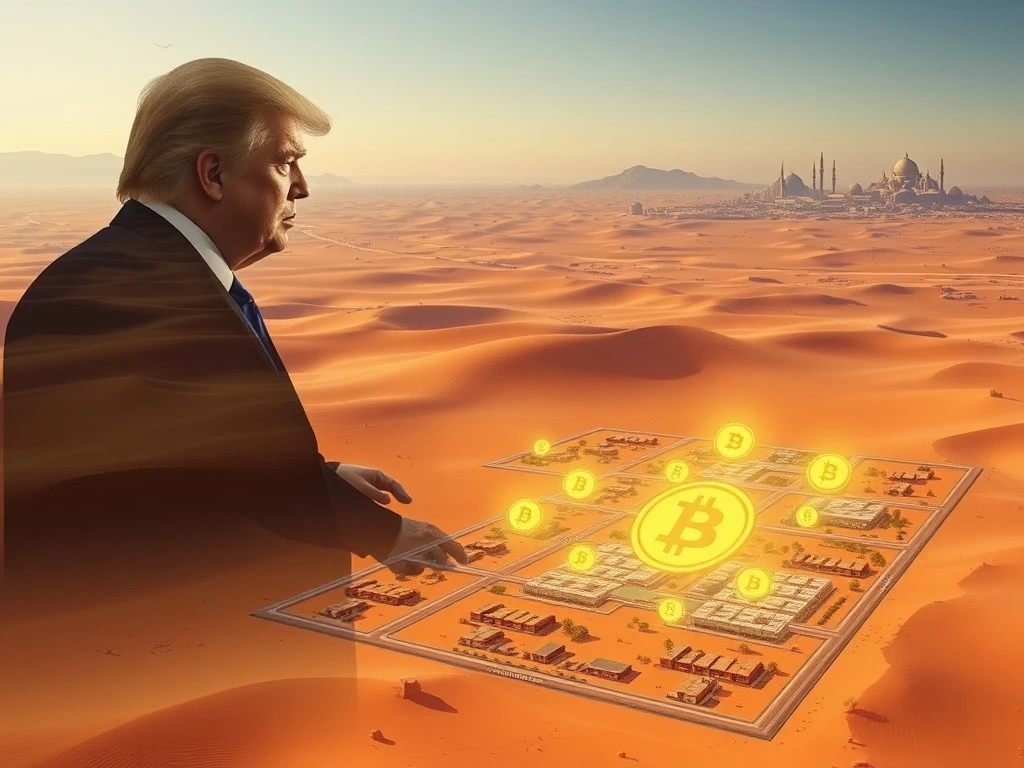Controversial Trump Gaza Plan Unveils Tokenized Land and Smart Cities

A groundbreaking and highly controversial proposal has emerged from circles within the Trump administration, suggesting a radical approach to post-war Gaza. This bold vision introduces a **Trump Gaza plan** that hinges on the innovative, yet contentious, concept of tokenized land and digital assets. It has immediately captured attention in the cryptocurrency world, signaling a potential intersection of geopolitics and blockchain technology.
The Bold Vision for Post-War Gaza: A US Trusteeship
Reports from The Washington Post detail a 38-page prospectus for Gaza’s future. This document, titled the Gaza Reconstitution, Economic Acceleration and Transformation Trust (GREAT Trust), outlines a significant shift. Specifically, it proposes a United States takeover of the Palestinian territory. This trusteeship would last for at least 10 years, initiating a period of profound change. The plan aims to displace approximately 2 million Gazans through a “voluntary” program. Furthermore, it offers them a specialized digital token in exchange for their land.
These tokens would serve a crucial purpose. They could later be redeemed for an apartment in one of up to eight planned “smart cities.” Alternatively, residents could use them for relocation elsewhere. The plan also includes temporary housing and food subsidies for up to four years. However, this proposal has already drawn sharp criticism. Muslim civil rights organization the Council on American-Islamic Relations (CAIR) called it “morally abhorrent and illegal under international law.” CAIR also suggested it would constitute “a war crime of historic proportions.”
Stills from an artificial intelligence-generated video Trump shared in February showing a Trump resort in Gaza. Source: Donald TrumpTokenized Land: A New Approach to Displacement and Ownership
The core of this audacious **Trump Gaza plan** involves tokenized land. The prospectus pitches an “innovative funding model.” It aims to utilize a land trust and “develop a blockchain registry for land and tokenization to enhance liquidity.” This strategy would tokenize Gaza, using a blockchain as the official “record of ownership.” Consequently, the land would be divided into tokens, allowing for “fractional ownership.”
These land tokens would be sold to investors. The proceeds could then fund “reconstruction and humanitarian efforts.” Moreover, these tokens would be available on secondary markets for crypto users to speculate on. All token transactions, naturally, would be recorded in the blockchain register. Gazan landowners, in turn, would receive a token for handing over their land. They could redeem this token for cash or an apartment within the strip. Each Palestinian choosing to leave the territory would also receive $5,000, four years of rent subsidies, and food for a year. This model presents a novel, albeit controversial, application of blockchain technology to real estate and humanitarian aid.
Implementing a Blockchain Registry for Gaza’s Future
The proposed **blockchain registry** forms the technological backbone of this entire initiative. By leveraging blockchain, the plan aims to create an immutable and transparent record of land ownership. This system could theoretically streamline property transfers and prevent disputes. Furthermore, it ensures a verifiable history for every land parcel. The concept of fractional ownership, facilitated by tokenization, also opens new avenues for investment. It allows a broader range of investors to participate in Gaza’s reconstruction. Returns from this scheme, the plan suggests, “could be reinvested in a new dedicated Palestinian Wealth Fund for the benefit of future Gazans.”
However, the document also notes a controversial financial incentive. The plan would be more profitable if it could increase the number of Gazans leaving the territory. It claims relocating residents is $23,000 cheaper per person. This aspect has fueled much of the ethical debate surrounding the proposal. The involvement of a team that previously worked for the Boston Consulting Group on the document’s financial planning adds a layer of corporate expertise to this ambitious, yet contentious, blueprint.
An excerpt of the plan to tokenize land in Gaza. Source: The Washington PostGaza Smart Cities: Reimagining Urban Development with AI
Beyond land tokenization, the prospectus outlines an ambitious urban development project. It envisions rebuilding Gaza with between six to eight “modern and AI-powered, **Gaza smart cities**.” In these futuristic urban centers, all services and their economies would operate on “ID-based AI-powered digital systems.” This vision extends to creating 10 “mega-projects.” These include new ports, a highway, a railway, and an AI datacentre. The plan even suggests Dubai-style artificial resort islands and an “Elon Musk Smart Manufacturing Zone.”
These smart cities represent a complete overhaul of Gaza’s infrastructure and economy. The integration of AI and digital systems aims to create highly efficient and interconnected urban environments. Such a transformation, if realized, would fundamentally change daily life for residents. The comprehensive nature of these projects highlights a desire for a complete societal and economic restructuring of the region, heavily reliant on advanced technology.
Potential for Crypto Investment and Economic Transformation
The blockchain-infused plan coincides with increased ties between Donald Trump and the crypto industry. In February, Trump stated the US should “take over” Gaza to make it the “Riviera of the Middle East.” This statement now resonates with the proposed plan’s vision for high-tech development and potential tourism. The integration of tokenized land and a **blockchain registry** creates significant opportunities for **crypto investment**. Investors could purchase tokens representing fractional ownership in land or projects, potentially on secondary crypto markets. This would allow for a new form of global participation in the region’s economic future.
Ultimately, this **Trump Gaza plan** represents a bold and unprecedented intersection of geopolitical strategy, advanced technology, and humanitarian concerns. Its focus on **tokenized land**, a **blockchain registry**, and **Gaza smart cities** positions it as a significant, albeit highly controversial, development for both the Middle East and the broader **crypto investment** landscape. The plan’s future remains uncertain, but its very existence sparks considerable debate regarding the role of digital assets in international affairs and post-conflict reconstruction.





